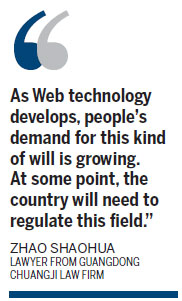Yang, a medical clerk in Wuhan, Hubei province, was surprised to receive a call last November telling him that his wife, who had died in a car accident two months before, had left a "digital will".
"I was shocked. They sent me an account number and password to log in to their website, and I found my wife had left me the bank account, the account number and password for our online store, and some words for me," said Yang, who asked not to be fully named.
"I feel grateful to this website, as it helped me to know my wife better, and saved me lots of trouble," he said.
The website, "Life's Black Box", has attracted more than 370,000 users since it was founded in 2009. Li Jia, founder of the service, said the idea came from an experience on a flight to Yunnan, during which the jet was hit by severe turbulence and was on the verge of crashing.
"At that moment I found I had left nothing to prepare for my death at all. At that moment, I really wanted to leave something," Li said.

"I feel proud of this service. Although I do not wish to see a day when we need to transfer a user's information, I do believe this can show our care for them," Li said.
But the service sparked controversy and concern over the legitimacy and privacy of a digital will.
Sina Weibo user "Lazy 8023" said the service can't be taken seriously. "After all, it does not have the force of law, and its security is not guaranteed. Who knows if a hacker has hacked into the website and revised the content?"
"It's unnecessary as we can make a video on our own to leave the account number and password. We can store the information on an encrypted disk, and avoid the danger of it being leaked online," said another user with the name "Universal Truth".
Zhao Shaohua, a lawyer from Guangdong Chuangji Law Firm, said that a digital will is not one of the five legal ways to make a will, and its authenticity can't be verified.
"We do not know whether it's the real will of the testator, whether he or she is under threat of others, or whether it is fake or not. We cannot even verify the testator's real identity, so the possibility of dispute is very high."
However, the website does meet the needs of some people, as it can serve as a bridge of emotional communication after the user dies.
"As Web technology develops, people's demand for this kind of will is growing. At some point, the country will need to regulate it. A website needs to show its capability to protect privacy and operate under supervision," Zhao said.
